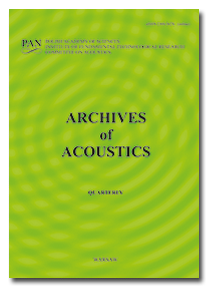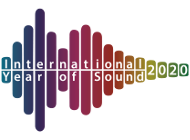10.1515/aoa-2015-0037
Influence of Musical Experience of Blind and Visually Impaired Young Persons on Performance in Selected Auditory Tasks on Performance in Selected Auditory Tasks
References
ACHESON D. J., MACDONALD M. C. (2009), Verbal working memory and language production: common approaches to the serial ordering of verbal information, Psychological Bulletin, 135, 1, 50–68.
BOGUSZ E., KOPROWSKA H., SKRODZKA E. (2012a), Investigation of performance in selected psychoacoustic tasks by visually impaired children and teenagers, Acta Physica Polonica A, 121, 1A, 13-18.
BOGUSZ E., KOPROWSKA H., SKRODZKA E. (2012b), Performance in a pitch memory task by visually handicapped children and youths, Archives of Acoustics, 37, 4, 549-553.
CHAN A. S., HO Y., CHEUNG M. (1998), Music training improves verbal memory. Nature, 396, 128.
CRUMMER G.C., WALTON J.P., WAYMAN J.W., HANTZ E.C., FRISINA R.D. (1994), Neural processing of musical timbre by musicians, nonmusicians and musicians possessing absolute pitch, Journal of the Acoustical Society of America, 95, 5, 2720-2727.
ELBERT T., STERR A., ROCKSTROH B., PANTEY C., MULLER M. M., TAUB E. (2002), Expansion of the tonotopic area in the auditory cortex of the blind, Journal of Neuroscience, 22, 9941–9944.
FRANKLIN M. S., MOORE K. S., YIP C., JONIDES J., RATTRAY K., MOHER J. (2008), The effects of musical training on verbal memory, Psychology of Music, 36, 353–365.
GAAB N., GASER C., ZAEHLE T., JANCKE L., SCHLAUG G. (2003), Functional anatomy of pitch memory—An fMRI study with sparse temporal sampling, Neuroimage, 19, 1417–1426.
GOUGOUX F., LEPORE F., LASSONDE M., VOSS P., ZATORRE R. J., BELIN P. (2004), Pitch discrimination in the early blind, Nature, 430, 309–1309.
HO Y., CHEUNG M., CHAN A. (2003), Music training improves verbal but not visual memory: Cross sectional and longitudinal explorations in children, Neuropsychology, 17, 3, 439–450.
HUNTSINGER C., JOSE P. (1991), A test of Gardner’s Modularity Theory: a Comparison of Short-term Memory for Digits and Tones, Psychomusicology, 10, 3-18.
KISHON-RABIN L., AMIR O., VEXLER Y., ZALTZ Y. (2001), Pitch discrimination: are professional musicians better than non-musicians?, Journal of Basic and Clinical Physiology and Pharmacogy, 12, 125–143.
MOORE B.C.J. (1999), An introduction to the Psychology of Hearing (in Polish), PWN, Poznań.
MOORE R.E., KEATON K., WATTS C. (2007), The role of pitch memory in pitch discrimination and pitch matching, Journal of Voice, 21, 5, 560-567.
MICHEYL Ch., DELHOMMEAU K., PERROT X., OXENHAM A.J. (2006), Influence of musical and psychoacoustical training on pitch discrimination, Hearing Research, 219, 36–47.
OZIMEK E. (2002), Sound and perceptron (in Polish), PWN, Warszawa-Poznań.
PITT M. A. (1994), Perception of pitch and timbre by musically trained and untrained listeners, Journal of Experimental Psychology: Human Perception and Performance, 20, 5, 976-986.
POSEDEL J., EMERY L., SOUZA B., FOUNTAIN C. (2012), Pitch perception, Working Memory, and Second Language Phonological Production, Psychology of Music, 40, 508-517.
RAKOWSKI A. (2009), The domain of pitch in music, Archives of Acoustics, 34, 4, 429-443.
RAKOWSKI A., ROGOWSKI P. (2007), Experiments on long-term and short-term memory for pitch in musicians, Archives of Acoustics, 32, 4, 815-826.
SCHELLENBERG E., PERETZ I. (2008), Music, language and cognition: Unresolved issues, Trends in Cognitive Sciences, 12, 2, 45–46.
SEITHER-PREISLER A., JOHNSON L., KRUMBHOLZ K., NOBBE A., PATTERSON R., SEITHER S., LÜTKENHÖNER B. (2007), Tone Sequences With Conflicting Fundamental Pitch and Timbre Changes Are Heard Differently by Musicians and Nonmusicians, Journal of Experimental Psychology: Human Perception and Performance, 33, 3, 743-751.
SPIEGEL M.F., WATSON C.S. (1984), Performance on frequency-discrimination tasks by musicians and non-musicians, Journal of the Acoustical Society of America, 76, 1690–1695.
TERVANIEMI M., JUST V., KOELSCH S., WIDMANN A., SCHRÖGER E. (2005), Pitch discrimination accuracy in musicians vs nonmusicians: an event-related potential and behavioral study, Experimental Brain Research, 161, 1-10.
TIERNEY A. T., BERGESON T. R., PISONI D. B. (2008), Effects of Early Musical Experience on Auditory Sequence Memory, Empirical Musicology Review, 3, 4, 178-186.
WAN C.Y., WOOD A.G., REUTENS D.C., WILSON S.J.
(2010), Early but not late-blindness leads to enhanced auditory perception, Neuropsychologia, 48, 344-348.
DOI: 10.1515/aoa-2015-0037





